Russia’s aggression against Western democracies has reached a new, destructive level, according to Robert Hannigan, the former head of the British intelligence service GCHQ (above).
An official regulator may be needed to defend democracy from fake news, reports suggest.
 Over the past 18 years, the Kremlin has gradually turned its back on the West — and now sees the E.U. as an aggressor in a new Cold War, notes Andrew Foxall (@drewfoxall), director of the Russia and Eurasia Studies Centre at the Henry Jackson Society, This happened in three distinct phases, he writes for the Washington Post’s Monkey Cage:
Over the past 18 years, the Kremlin has gradually turned its back on the West — and now sees the E.U. as an aggressor in a new Cold War, notes Andrew Foxall (@drewfoxall), director of the Russia and Eurasia Studies Centre at the Henry Jackson Society, This happened in three distinct phases, he writes for the Washington Post’s Monkey Cage:
E.U.-Russia relations — like broader West-Russia relations — have degraded still further over the past two years, most obviously since the poisoning of Sergei Skripal, a former Russian military intelligence officer, in England in March 2018, and Putin’s reelection as president later the same month. But this slide has been underway for the past 18 years, as Russia has shifted from treating cooperation with the E.U. as desirable to seeing confrontation with the E.U. as unavoidable.
 In the old days, these things were done differently. There were KGB couriers, bags of cash, “Moscow gold,” secret subsidies for far-left printing presses: The Soviet Communist Party was seeking to undermine Western democracy, covertly, notes analyst Anne Applebaum, a board member of the National Endowment for Democracy. Modern Russia, by contrast, has a far easier task. Nowadays, when the Kremlin makes a covert effort to exert political influence and undermine democracy, it has far more tools available — big companies, rich oligarchs, both of which need to keep in with the government — and far more psychological leverage, she writes for the Washington Post.
In the old days, these things were done differently. There were KGB couriers, bags of cash, “Moscow gold,” secret subsidies for far-left printing presses: The Soviet Communist Party was seeking to undermine Western democracy, covertly, notes analyst Anne Applebaum, a board member of the National Endowment for Democracy. Modern Russia, by contrast, has a far easier task. Nowadays, when the Kremlin makes a covert effort to exert political influence and undermine democracy, it has far more tools available — big companies, rich oligarchs, both of which need to keep in with the government — and far more psychological leverage, she writes for the Washington Post.
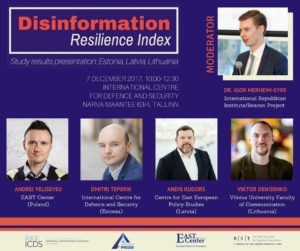 The countries of Eastern and Central Europe have become Russia’s test field for new propaganda methods, and a special target for information warfare, notes Ukrainian Prism. In partnership with leading think tanks of the region, it will present a Disinformation Resilience Index covering fourteen countries in order to come up with common solutions for countering propaganda (see below).
The countries of Eastern and Central Europe have become Russia’s test field for new propaganda methods, and a special target for information warfare, notes Ukrainian Prism. In partnership with leading think tanks of the region, it will present a Disinformation Resilience Index covering fourteen countries in order to come up with common solutions for countering propaganda (see below).
Russia is a rival power “engaged in a very sophisticated campaign of subversion to affect our confidence in democratic institutions, in democratic processes—including elections,” said then–National Security Adviser H.R. McMaster, a new RAND paper on European geopolitics observes.
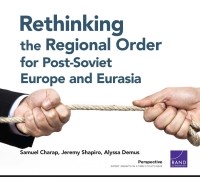 “To this day, many in the West see regional order through the lens of the democratic transitions in East Central Europe (ECE)” say the authors. Now, the West’s democracies should adopt a new approach to “in-between” countries, such as Ukraine, which are sandwiched between unattainable Euro-Atlantic aspirations, and Russian security interests, they contend.
“To this day, many in the West see regional order through the lens of the democratic transitions in East Central Europe (ECE)” say the authors. Now, the West’s democracies should adopt a new approach to “in-between” countries, such as Ukraine, which are sandwiched between unattainable Euro-Atlantic aspirations, and Russian security interests, they contend.
But their study has the same flaws as the board-game Risk, notes CEPA’s Edward Lucas:
- For a start, it assumes moral equivalence between all parties. There is no difference between the red team and the blue team. That is fine in a board game. But in real life that assumption puts Russia, the successor
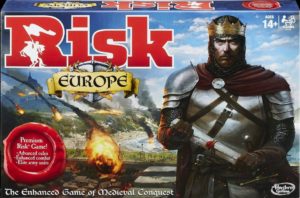 and in large part unrepentant defender of the mass-murdering Soviet Union, on the same level the European Union, which is the world’s largest and most prosperous democratic entity, and NATO, a uniquely successful military alliance of democracies.Secondly, it largely ignores the wishes of people in the countries directly concerned. Ukrainians died carrying blood-soaked European flags on the streets of Kyiv in 2014, because they wanted the same dignity, liberty, security, and justice that their fellow-Europeans enjoy. Too bad. The word “Maidan,” which epitomizes that glorious idealistic insurrection, appears only once, in a timeline which dismisses Ukraine’s foreign policy as a “chaotic and unsustainable” attempt to balance the West and Russia.
and in large part unrepentant defender of the mass-murdering Soviet Union, on the same level the European Union, which is the world’s largest and most prosperous democratic entity, and NATO, a uniquely successful military alliance of democracies.Secondly, it largely ignores the wishes of people in the countries directly concerned. Ukrainians died carrying blood-soaked European flags on the streets of Kyiv in 2014, because they wanted the same dignity, liberty, security, and justice that their fellow-Europeans enjoy. Too bad. The word “Maidan,” which epitomizes that glorious idealistic insurrection, appears only once, in a timeline which dismisses Ukraine’s foreign policy as a “chaotic and unsustainable” attempt to balance the West and Russia.
This leaves no room for Ukrainians’ own views of, and struggle against, their corrupt, oligarchic, and often treasonous political rulers, Lucas observes. RTWT
Western governments are struggling to build some kind of model to deter cyberattackers, TechRepublic adds.
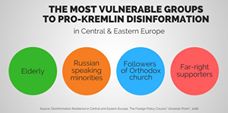 “What deterrence is fundamentally about is making the cost of doing something too high for someone to want to do it,” says Ewan Lawson, senior research fellow for military influence at the Royal United Services Institute (RUSI), who was previously with Joint Forces Command with responsibility for the development of cyberwarfare capabilities.
“What deterrence is fundamentally about is making the cost of doing something too high for someone to want to do it,” says Ewan Lawson, senior research fellow for military influence at the Royal United Services Institute (RUSI), who was previously with Joint Forces Command with responsibility for the development of cyberwarfare capabilities.
“The two forms we’ve tended to see is deterrence through hardening—just making something too difficult to be done—or deterrence through punishment, where you impose a cost on the individual or organization,” he says.
Fears are growing over WhatsApp’s role in circulating false information in India, Brazil, Kenya and now the UK, the Guardian reports:
New analysis by the University of Oxford’s Reuters Institute found that consumers around the world are reading less news on Facebook and are increasingly turning to WhatsApp – which has 1.5 billion active users worldwide – to share and discuss news stories.
 “In some sense it’s not that dissimilar to ordinary conversations but what makes it different is the speed with which these things can spread,” said Nic Newman, who co-wrote the report. “The reasons why people are moving to these spaces is because they get more privacy. If you’re in an authoritarian regime you can use it to talk safely about politics – but it can also be used for nefarious means.”
“In some sense it’s not that dissimilar to ordinary conversations but what makes it different is the speed with which these things can spread,” said Nic Newman, who co-wrote the report. “The reasons why people are moving to these spaces is because they get more privacy. If you’re in an authoritarian regime you can use it to talk safely about politics – but it can also be used for nefarious means.”
A dark image of the Baltic states was (again), painted in pro-Kremlin disinformation this week, Disinformation Review adds:
- Firstly, the Latvian Army was accused of shooting civilians in 1991, during Latvia’s transition to independence from the Soviet Union….Of course, these claims have been debunked several times before as the theme of staged ’colour revolutions’ is recurring in pro-Kremlin disinformation.
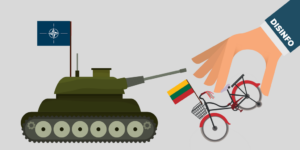
- Secondly, Latvia was again accused of restricting the rights of ”non-citizens” (primarily ethnic Russians) residing in Latvia. In fact, non-citizens enjoy equal protection under the law both in Latvia and while living or travelling abroad, and are the only group of persons, in addition to citizens, who are granted permanent residence in Latvia ex lege. Furthermore, non-citizens are able to become citizens of Latvia through a naturalization procedure.
- Thirdly, we learned from the pro-Kremlin sphere the disturbing story that a child was killed during the ongoing NATO exercise Saber Strike 2018 in Lithuania. …The story was quickly debunked by journalists, the Statcom Department of the Lithuanian Armed Forces and the Minister of National Defence of Lithuania Raimundas Karoblis. Let us also recall that this is not the first time that pro-Kremlin disinformation manipulates sources to look like respected media. It is also not the first time that children are being used in pro-Kremlin disinformation.
“Russia: 21st Century Disrupter in Europe” is the subject of a discussion hosted by the United States Institute of Peace (USIP) Speakers: Rep. Francis Rooney, R-Fla.; Rep. William Keating, D-Mass.; and Nancy Lindborg, USIP president.
9 a.m. June 20, 2018. Venue: USIP, 2301 Constitution Avenue NW, Washington, D.C.
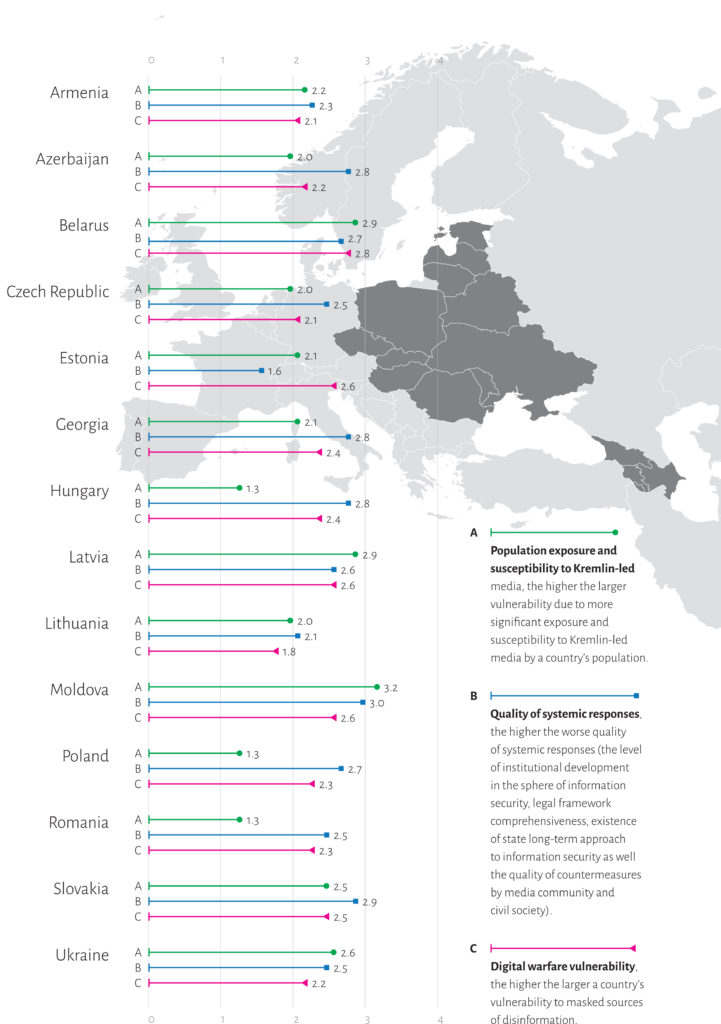
CEE Resilience
Credit: UA Prism







